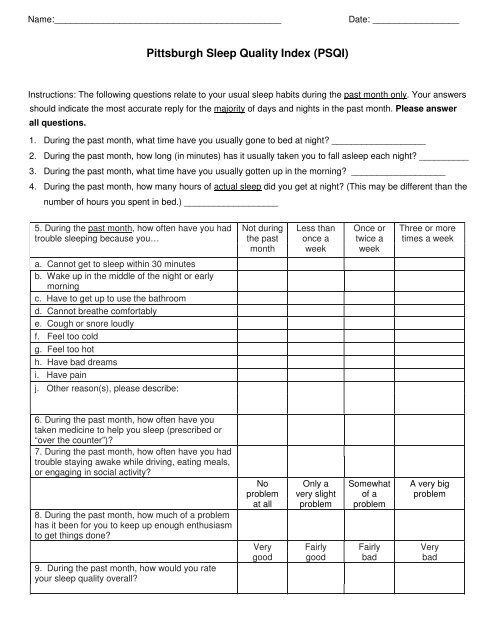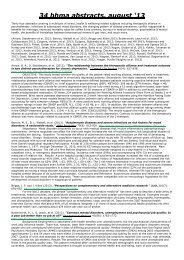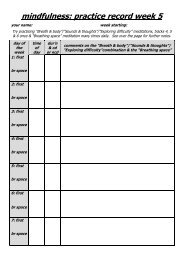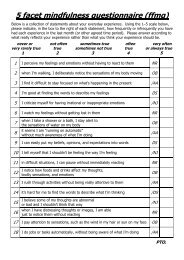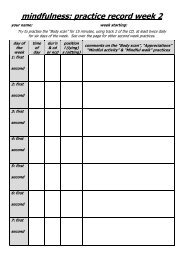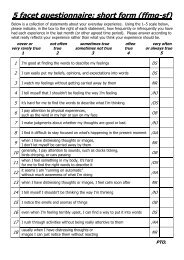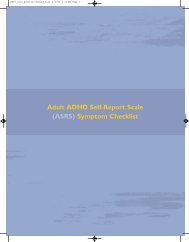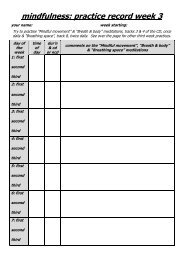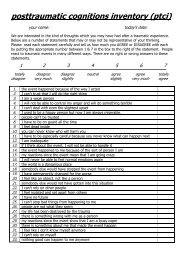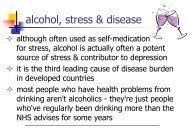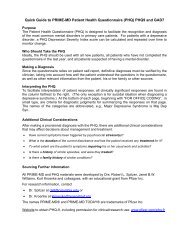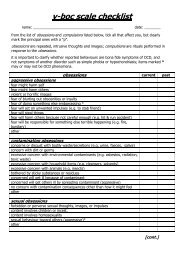Pittsburgh Sleep Quality Index (PSQI) - Goodmedicine.org.uk
Pittsburgh Sleep Quality Index (PSQI) - Goodmedicine.org.uk
Pittsburgh Sleep Quality Index (PSQI) - Goodmedicine.org.uk
You also want an ePaper? Increase the reach of your titles
YUMPU automatically turns print PDFs into web optimized ePapers that Google loves.
Name:__________________________________________<br />
Date: ________________<br />
<strong>Pittsburgh</strong> <strong>Sleep</strong> <strong>Quality</strong> <strong>Index</strong> (<strong>PSQI</strong>)<br />
Instructions: The following questions relate to your usual sleep habits during the past month only. Your answers<br />
should indicate the most accurate reply for the majority of days and nights in the past month. Please answer<br />
all questions.<br />
1. During the past month, what time have you usually gone to bed at night? ___________________<br />
2. During the past month, how long (in minutes) has it usually taken you to fall asleep each night? __________<br />
3. During the past month, what time have you usually gotten up in the morning? ___________________<br />
4. During the past month, how many hours of actual sleep did you get at night? (This may be different than the<br />
number of hours you spent in bed.) ___________________<br />
5. During the past month, how often have you had Not during Less than Once or Three or more<br />
trouble sleeping because you… the past once a twice a times a week<br />
month week week<br />
a. Cannot get to sleep within 30 minutes<br />
b. Wake up in the middle of the night or early<br />
morning<br />
c. Have to get up to use the bathroom<br />
d. Cannot breathe comfortably<br />
e. Cough or snore loudly<br />
f. Feel too cold<br />
g. Feel too hot<br />
h. Have bad dreams<br />
i. Have pain<br />
j. Other reason(s), please describe:<br />
6. During the past month, how often have you<br />
taken medicine to help you sleep (prescribed or<br />
“over the counter”)?<br />
7. During the past month, how often have you had<br />
trouble staying awake while driving, eating meals,<br />
or engaging in social activity?<br />
8. During the past month, how much of a problem<br />
has it been for you to keep up enough enthusiasm<br />
to get things done?<br />
9. During the past month, how would you rate<br />
your sleep quality overall?<br />
No Only a Somewhat A very big<br />
problem very slight of a problem<br />
at all problem problem<br />
Very Fairly Fairly Very<br />
good good bad bad
10. Do you have a bed partner or room<br />
mate?<br />
If you have a room mate or bed partner, ask<br />
him/her how often in the past month you have<br />
had:<br />
a. Loud snoring<br />
b. Long pauses between breaths while asleep<br />
c. Legs twitching or jerking while you sleep<br />
d. Episodes of disorientation or confusion<br />
during sleep<br />
e. Other restlessness while you sleep, please<br />
describe:<br />
No bed<br />
partner or<br />
room mate<br />
Not during<br />
the past<br />
month<br />
Partner/room<br />
mate in<br />
other room<br />
Less than<br />
once a week<br />
Partner in<br />
same room but<br />
not same bed<br />
Once or twice<br />
a week<br />
Partner in<br />
same bed<br />
Three or<br />
more times<br />
a week
Scoring the <strong>PSQI</strong><br />
The order of the <strong>PSQI</strong> items has been modified from the original order in order to<br />
fit the first 9 items (which are the only items that contribute to the total score) on a single<br />
page. Item 10, which is the second page of the scale, does not contribute to the <strong>PSQI</strong><br />
score.<br />
In scoring the <strong>PSQI</strong>, seven component scores are derived, each scored 0 (no<br />
difficulty) to 3 (severe difficulty). The component scores are summed to produce a global<br />
score (range 0 to 21). Higher scores indicate worse sleep quality.<br />
Component 1: Subjective sleep quality—question 9<br />
Response to Q9 Component 1 score<br />
Very good 0<br />
Fairly good 1<br />
Fairly bad 2<br />
Very bad 3<br />
Component 1 score:_____<br />
Component 2: <strong>Sleep</strong> latency—questions 2 and 5a<br />
Response to Q2 Component 2/Q2 subscore<br />
< 15 minutes 0<br />
16-30 minutes 1<br />
31-60 minutes 2<br />
> 60 minutes 3<br />
Response to Q5a Component 2/Q5a subscore<br />
Not during past month 0<br />
Less than once a week 1<br />
Once or twice a week 2<br />
Three or more times a week 3<br />
Sum of Q2 and Q5a subscores Component 2 score<br />
0 0<br />
1-2 1<br />
3-4 2<br />
5-6 3<br />
Component 2 score:_____<br />
Component 3: <strong>Sleep</strong> duration—question 4<br />
Response to Q4 Component 3 score<br />
> 7 hours 0<br />
6-7 hours 1<br />
5-6 hours 2<br />
< 5 hours 3<br />
Component 3 score:_____<br />
Component 4: <strong>Sleep</strong> efficiency—questions 1, 3, and 4<br />
<strong>Sleep</strong> efficiency = (# hours slept/# hours in bed) X 100%<br />
# hours slept—question 4<br />
# hours in bed—calculated from responses to questions 1 and 3<br />
<strong>Sleep</strong> efficiency Component 4 score<br />
> 85% 0<br />
75-84% 1<br />
65-74% 2<br />
< 65% 3<br />
Component 4 score:_____
Component 5: <strong>Sleep</strong> disturbance—questions 5b-5j<br />
Questions 5b to 5j should be scored as follows:<br />
Not during past month 0<br />
Less than once a week 1<br />
Once or twice a week 2<br />
Three or more times a week 3<br />
Sum of 5b to 5j scores Component 5 score<br />
0 0<br />
1-9 1<br />
10-18 2<br />
19-27 3<br />
Component 5 score:_____<br />
Component 6: Use of sleep medication—question 6<br />
Response to Q6<br />
Component 6 score<br />
Not during past month 0<br />
Less than once a week 1<br />
Once or twice a week 2<br />
Three or more times a week 3<br />
Component 6 score:_____<br />
Component 7: Daytime dysfunction—questions 7 and 8<br />
Response to Q7 Component 7/Q7 subscore<br />
Not during past month 0<br />
Less than once a week 1<br />
Once or twice a week 2<br />
Three or more times a week 3<br />
Response to Q8 Component 7/Q8 subscore<br />
No problem at all 0<br />
Only a very slight problem 1<br />
Somewhat of a problem 2<br />
A very big problem 3<br />
Sum of Q7 and Q8 subscores Component 7 score<br />
0 0<br />
1-2 1<br />
3-4 2<br />
5-6 3<br />
Component 7 score:_____<br />
Global <strong>PSQI</strong> Score: Sum of seven component scores:___________<br />
Copyright notice: The <strong>Pittsburgh</strong> <strong>Sleep</strong> <strong>Quality</strong> <strong>Index</strong> (<strong>PSQI</strong>) is copyrighted by Daniel J.<br />
Buysse, M.D. Permission has been granted to reproduce the scale on this<br />
website for clinicians to use in their practice and for researchers to use in nonindustry<br />
studies. For other uses of the scale, the owner of the copyright should<br />
be contacted.<br />
Citation: Buysse, DJ, Reynolds CF, Monk TH, Berman SR, Kupfer DJ: The <strong>Pittsburgh</strong><br />
<strong>Sleep</strong> <strong>Quality</strong> <strong>Index</strong> (<strong>PSQI</strong>): A new instrument for psychiatric research and<br />
practice. Psychiatry Research 28:193-213, 1989


